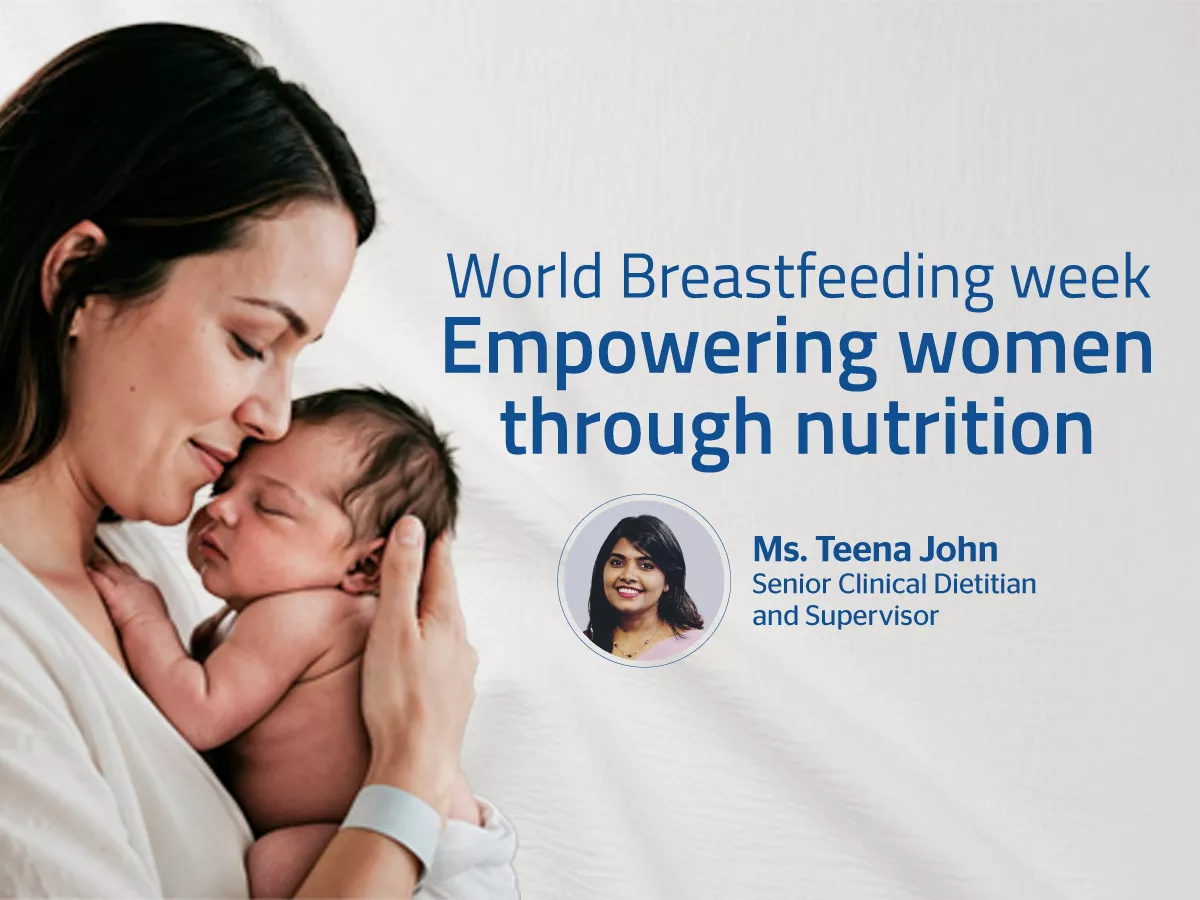Breastfeeding is more than just a way to nourish a baby -it is a cornerstone of public health. We play an important role in empowering new mothers with nutritional strategies that support both lactation and maternal well-being. This year’s WBW theme focuses on “Enabling breastfeeding: Making a difference for working parents”, and as part of the healthcare system, ensuring mothers have both nutritional and practical support is essential.
Why Breastfeeding is important?
According to the World Health Organization (WHO) and UNICEF, exclusive breastfeeding for the first six months is one of the most effective ways to ensure child health and survival. Breast milk provides:
- Balanced nutrition suited to the baby's needs
- Immune protection through antibodies
It is beneficial:
For the baby: Breast milk contains all the essential nutrients-proteins, fats, carbohydrates, vitamins and minerals and antibodies-in the perfect balance. It supports brain development, builds immunity and lowers the risk of infections and even obesity later in life.
For the mother: It helps the uterus return its normal Sze, reduces postpartum bleeding, burns extra calories and lowers the long term risk of breast and ovarian cancers,type-2 diabetes and high blood pressure.
But for a mother, successful breastfeeding depends on both emotional support and nutritional adequacy.
The Nutritional Needs of a Lactating Mother
Breastfeeding increases a mother's caloric, protein, and micronutrient needs. Here's how:
1. Increased Calorie Requirement
An exclusively breastfeeding mother needs an additional 500 kcal/day in the first 6 months (as per ICMR-NIN 2020 and Academy of Nutrition & Dietetics), along with higher protein, calcium, DHA, iodine, and fluid needs.
The composition of breast milk-especially immune factors like IgA, lactoferrin, and oligosaccharides-relies heavily on the mother’s nutrient reserves and diet quality.
The focus should be on nutrient-dense foods rather than high-calorie, low-nutrient snacks.
2. Protein
Protein needs increase by approximately 15–20 g/day during lactation.
Good sources: eggs, dairy, pulses, fish, lean meat, and soy.
3. Hydration
- Breast milk is ~87% water. Ensuring adequate fluid intake (minimum 3 litres/day) is needed.
- Include plain water, soups, buttermilk, coconut water, and porridges as healthy options.
4. Micronutrients
Certain vitamins and minerals are particularly important:
Nutrient Role Best Sources
- Calcium: Milk production, bone health (Sources: Ragi, milk, sesame seeds)
- Iron: Prevent postpartum anemia (Sources: Green leafy vegetables, dates, jiggery)
- Zinc: Immunity, wound healing (Sources: Nuts, seeds, eggs)
- Vitamin A: Immune support, vision (Sources: Carrots, papaya, pumpkin)
- Vitamin B12: Neurological health (Sources: Animal-based foods, fortified cereals)
- Vitamin D: Bone health (often deficient) (Sources: Sunlight, supplements if needed)
- Postpartum supplementation should be individualized and based on nutritional assessment and lab values.
Understanding Galactagogues- Foods That May Support Milk Production
Galactagogues are foods, herbs, or medications believed to promote breast milk production. While not all are supported by strong clinical trials, many have traditional and observational support, especially when combined with proper breastfeeding technique and maternal care.
Common Food-Based Galactagogues
- Galactagogue Nutritional Role
- Fenugreek seeds (Uluva) - Rich in phytoestrogens; may stimulate milk ducts
- Garlic - May improve milk odor and infant feeding behaviour
- Shatavari (Asparagus racemosus) - Used in Ayurveda; considered safe in moderation
- Moringa (Drumstick leaves) - High in calcium, iron, and vitamin C
- Ginger - May help stimulate let-down reflex
- Fennel seeds - May ease digestion and support estrogenic activity
- Whole grains (especially oats): Rich in iron and fiber
- Cumin seeds: Traditionally used in Kerala cuisine to support digestion and lactation
- Overuse of herbal galactagogues or self-medication without professional guidance can be harmful.
Practical Nutrition Tips for Breastfeeding Mothers
1. Eat frequently,Eat balanced
- Breast feeding burns around 500 calories extra per day. Small frequent meals will help.
- Include: Whole grains (rice,ragi,oats)
- Good proteins (Dal,egg,fish,lean meats)
- Vegetables and fruits(especially green leafy vegetables)
2. Stay hydrated:
- Drink at least 2.5-3 litres of water, can choose soups, buttermilk ,etc as healthy options.
- Coconut water, jeera water, etc also will help.
3. Focus on Iron and Calcium:
- Important for recovery and milk quality, Include small fishes, drumstick leaves, ragi,milk and its products, sesame seeds,almondsetc.
4. Omega -3 for baby’s brain:
- Found in fish like sardine,mackeral,etc,flax seeds, walnuts
5. Avoid these:
- Caffeine:” Not more than 1-2 cups of coffee per day
- Excessive spices/Gas-forming foods: Watch how baby reacts.
- Alcohol and Tobacco
When to Refer to a Clinical Dietitian
- Refer for personalized nutrition advice when:
- There is poor weight gain in the infant
- Mother feels low energy, shows signs of nutritional deficiency
- History of food allergies or intolerance
- Lactation difficulties with special diets (e.g., vegan, diabetic)
Breastfeeding is not just a biological act but a nutritionally demanding phase that needs awareness, support, and guidance. By ensuring that mothers are well-nourished, well-informed, and well-supported, we can truly empower them -not just during Breastfeeding Week, but every day.





